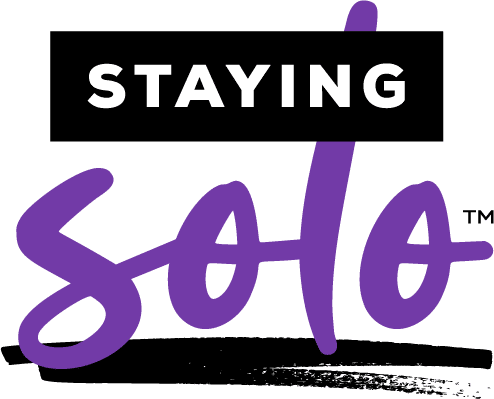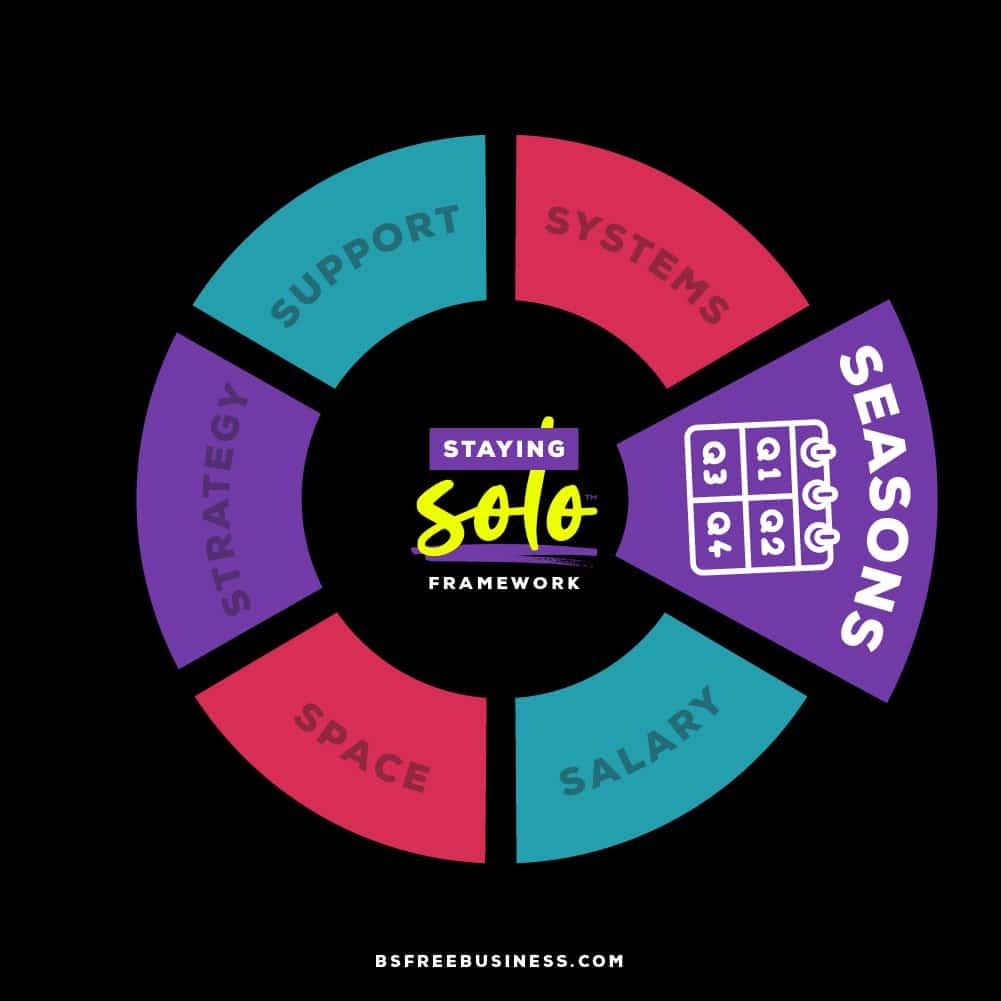
Rethinking
Planning
to Focus on Seasons
By Maggie Patterson
All opinions in this post are my opinions and mine alone.
Most of us start our businesses for more flexibility and freedom, but somewhere along the way find that we’re trapped in a cycle of hustling. To stay solo, you need a realistic planning process that works for you and keeps you from chasing things that don’t matter.
In this episode of the Staying Solo series, we’re talking about planning with a focus on how to do it in a way that actually works not just for your business but your brain and your life.
Listen Now To This Essay On The BS-Free Service Business Show
Common Planning Challenges
Before you think I hate all things planning. I love planners. I love all the accessories and a fresh set of Zebra pens to write in my planner. I’m a sucker for year-on-the-wall calendars and even planning books and podcasts.
But friends, despite my love for these things and my being convinced it may fix my life and business, it never has. (Still waiting...)
Planning is a necessary business activity but not a magical fix. Especially when you find yourself running into common planning challenges that create more problems.
Does This Fit Your Life?
You started a business to support your life, yet so many entrepreneurial planning solutions separate the two. You need your business goals to be compatible with your personal needs.
Your life goals should come first and not be put on hold for your business. As we talked about in the episode on space, no goal is worth pursuing at the expense of your joy and happiness. No revenue goal or business accomplishment will be worth it if it’s at the expense of the rest of your life and has a negative impact on your well being and mental health.
Does This Fit Your Business?
Too many times planning approaches tools are one-size-fits-all, and they aren’t right for the type of business you run.
As a service business, you need an approach that recognizes that you’re working on your business goals and supporting your clients. As a solo business owner, you also need an approach that recognizes you don’t have a team of 12 people to help make this happen.
You need a fundamentally different approach based on your type of business and the ability to hyperfocus on the core areas that will actually move things ahead.
For solo business owners, you need to make a habit of challenging yourself about what you decide to prioritize. Does it align with your overall business strategy? How does it contribute to specific needs around your marketing, sales and service?
Don’t mistake a vanity project for a strategic one. Something that doesn’t actually contribute to your business in a meaningful way is busy work would be better spent elsewhere.
Does This Work For You?
Just like a planning process may not work for your business, it may not work for you. You must ensure that any goals or priorities you set align with your unique needs, how your brain works, your values, your work style, strengths and more.
It’s not up to me to tell you what goals are right (or wrong) for you, but I challenge you to question if the planning and goal setting you’re doing is aligned with your needs. Afterall, why would you work towards goals that are going to make you miserable?
Does This Waste Time?
I get it. Planning is fun. And it feels like you’re doing meaningful work. It can calm you down when you’re worked up. (Trust me, I do all of these things.)
But we can use it as an avoidance mechanism for doing the actual work. We can stall out on making progress on our goals by procrastinating.
I’m 100% guilty of this procrasti-planning, and being aware of my tendency to do this forces me to check in on WHY I want to plan. Do I really need to plan, or is something else going on entirely?
On the flip side of procrasti-planning is planning in a way that has you in hot pursuit of far too many priorities. I encourage my clients to focus on a maximum of three priorities for a three-month period, as that’s realistically what they can focus on. It’s far better to bring one or two goals across the finish line than to have 12 that are only 10% in progress.
Ultimately, discernment is the key to planning as a solo business owner. You need to have the discipline to prioritize only what’s aligned with you and your business’ needs.
Any goals you set need to be tightly aligned with your business strategy, focusing on marketing, sales and service.
Shifting to Seasonal Planning
Something I’ve come to loathe is the big end-of-year push on planning that’s all about making the coming you the most magical year you’ve ever had.
Talk about pressure! This approach to planning is fundamentally flawed as it puts so much focus on a one-time event and not nearly enough focus on the process.
Planning shouldn’t be static. It's an ongoing process in your business, especially as life happens, business evolves, and you sometimes even change your mind.
So when you think about planning, you need to consider the ongoing care and feeding of your plan and goals.
Which brings me to the concept of seasons.
I’ve been doing quarterly planning for years now, and it’s really and truly been the only style of planning that has ever stuck. It’s given me enough room to have living, breathing plans within the business so I can test and tweak as I go.
The biggest challenge with this type of planning is that I’ve followed the calendar year to determine my quarters. What would happen is that I'd be on track for two quarters of the year, and for the other two, I’d struggle through them.
Eventually, I became wise and recognized that I needed to cut my plans in my quarters where I struggled. Otherwise (especially in Q1) I would end up feeling worse than I already did while dealing with seasonal depression.
I decided to adjust my quarterly planning to align with the seasons, and I noticed many of my clients doing this naturally as well. As humans, we’re much more attuned to the actual seasons than the seemingly arbitrary quarters on a calendar, so this makes complete sense.
Today, my planning is built purely around the four seasons, with two seasons very focused on the business Spring (Mar/Apr/May) and Fall (Sept/Oct/Nov), and two seasons that are more chill business-wise Summer (Jun/Jul/Aug) and Winter (Dec/Jan/Feb).
You don’t have to align around the seasons specifically, but it’s more about having the freedom to shift your planning and more importantly goals in a way that honors the season you’re in currently.
The best part is that as a solo business owner, you can find the way that works BEST for you and you don’t have to stick to one rigid formula. Watch for the natural cycles in your life and business and plan accordingly, even if it’s not aligned with the calendar!

What Season Are You Really In?
Years ago, I heard the term “season of sacrifice” on the podcast Happier in Hollywood, and I always think about it.
Not because we should be constantly sacrificing ourselves to our business, but rather because we need to recognize what season we may be in either in our business or life at any given time.
That may sound obvious, but in my personal experience and working with my clients, most of us aren’t good at this. We want to adopt a “business as usual” approach and keep on truckin’.
In a world that’s obsessed with the next milestone or revenue goal, it’s far too easy to tell yourself that you can get through it if you just buckle down or do this one thing.
But what happens when you just can’t white-knuckle your way through and make your plans a reality? Spoiler: It's not good. You end up feeling like crap.
Your goals, plans, and business need to adjust to the season you’re in. Especially as a team of one. You’re a limited resource, and the last thing you want to do is hustle your way through and drive yourself into a state of complete and utter burnout.
If you’re wondering what types of seasons you may encounter, there are too many to count. I’ve dealt with so many different seasons both personally and professionally, and being willing to embrace the season (good, bad, or seriously ugly) meant I was able to adjust as needed.
Sometimes these were life events, professional challenges, or even personal decisions where I was feeling some kind of way. (My fuck it era of 2020 really comes to mind here, that was a whole mood and a real season!)
With my clients, I’ve watched them decide that this isn't a season for growth, a season for saying no, a season for going slow, and a season to make big things happen.
The best part is that you get to choose, and the seasons always change. Another one will come soon enough, and you can choose something new.
They’re temporary, so what if you decided to work with them instead of resisting? What if you decided to use them strategically to help you create realistic plans instead of trying to box yourself in an arbitrary version of what your business should look like right now?
That’s the approach that more solo business owners need and less of this big box hyped-up celebrity entrepreneur style planning.
